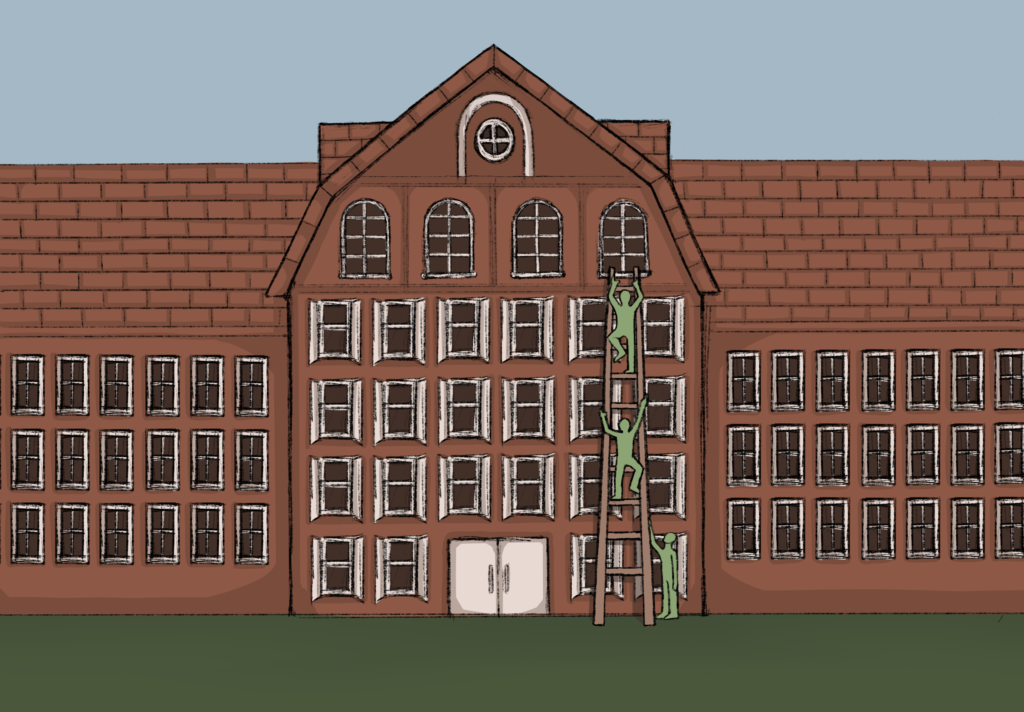
Graphic by Leah Han ’27/The Choate News
By Francesca Howard ’27, Copy Editor
You’re at the starting line of a marathon, ready to give it your all, only to find out that the race started ages ago without you. Panic sets in as you scramble to catch up, but no matter how fast you run, the finish line seems miles away.
Most juniors facing the college application process know this feeling all too well. Though most of us aren’t track stars, surviving junior year is no easy task. From drowning in schoolwork, stressing over college applications, or just trying to function before 8 a.m. classes, junior year is not for the weak of heart. This exhaustion only grows come January when juniors are assigned a college counselor and suddenly have to make sense of a complex process that’s been in the works for years. College counseling is designed to guide students through the admissions process by helping them choose schools, meet deadlines, and put their best foot forward in their applications.
While students can research schools and prepare on their own, counselors can offer crucial professional insight and expertise. They have insider knowledge of admissions trends, understand what specific schools are really looking for, and know what makes for a strong application. However, by the time students get any advice to navigate the college admissions process, they’ve already registered for Advanced Placement (AP) exams, worked as a camp counselor (despite not liking little kids), and developed a crippling caffeine addiction. It’s only then that it dawns on them: they’ve been sprinting without so much as a warm-up.
Beginning the college counseling process before junior year would give students a much-needed head start. A study conducted by the National Association for College Admission Counseling (NACAC) found that 59% of those who had applied to college wished that they had more support in the process. This is no different at Choate. With more support earlier on, students would have time to break in their shoes, stretch, and figure out when to push and when to pace themselves. Just like marathon runners don’t sprint from start to finish, students would be able to take their time and plan accordingly for the long haul. This would encourage them to choose their classes thoughtfully, explore their interests, and avoid the pressure of last-minute scrambling.
Junior year is hard enough as it is, especially at a prestigious school like Choate. With its rigorous academics, top-notch athletics, and competitive atmosphere, Choate fosters an environment of near-constant pressure. Whether it’s staying up until late at night to study for a calculus exam, pushing to the brink of collapse on the soccer field, or playing the piano until fingers go numb, Choate students don’t back down from a challenge.
However, when college application season rolls around, they must balance their packed schedules with the added stress of standardized tests, college essays, and high-stakes decisions about their futures. If we began discussions in freshman or sophomore years — or even just had more informal workshops — we could use that time to figure out what we want from a college experience and make decisions without feeling like we’re racing against the clock.
I spoke to Dean of College Counseling Ms. Marcia Landesman, who made a strong case in defense of Choate’s current timeline. According to her, the focus of the early high school years should be on personal growth. This is a fair point: high school should be about more than just preparing for college. While it’s true that starting too early could potentially detract from the genuine joy of learning and the quintessential high school experience, we need to seek out a middle ground. We want to avoid over-preparation; however, preparation in itself isn’t necessarily a bad thing.
I’ve been thinking about college since my freshman year and I’d wager that most of my classmates have too. We’re told not to worry and that our time will come, but for many of us, it already feels like we’re behind. We’ve been making choices with college in mind for quite some time, whether or not Choate acknowledges it. Waiting until junior winter to address these anxieties doesn’t stop them from existing earlier; it just means we’re left to navigate them alone.
Another argument I’ve heard is that starting earlier could lead to burnout. There’s no denying that the college admissions process is exhausting, and if we stretch it out too long, students could feel worn down by the time senior year arrives. However, I think this risk could be minimized by pacing ourselves.
Instead of diving into intense college prep during one’s sophomore year, we could start with introspection. What do we want from college? What types of environments do we thrive in? These are tough questions, and they take time to figure out. While the current college counseling system encourages students to consider these questions, it’s simply too late by junior year. This isn’t to say that a freshman should have all these answers, but rather that they should be thinking about these questions well in advance. This way, when the time comes, they feel more confident in their decisions.
The college admissions process is daunting no matter when it begins, but an earlier start might help students feel more in control. With increasing competitiveness and decreasing admission rates, getting ahead could alleviate some stress and better prepare students for what’s to come. As I am getting ready to lace up my shoes for the lengthy yearlong race starting this winter, I hope Choate considers giving students a little more time to warm up.



